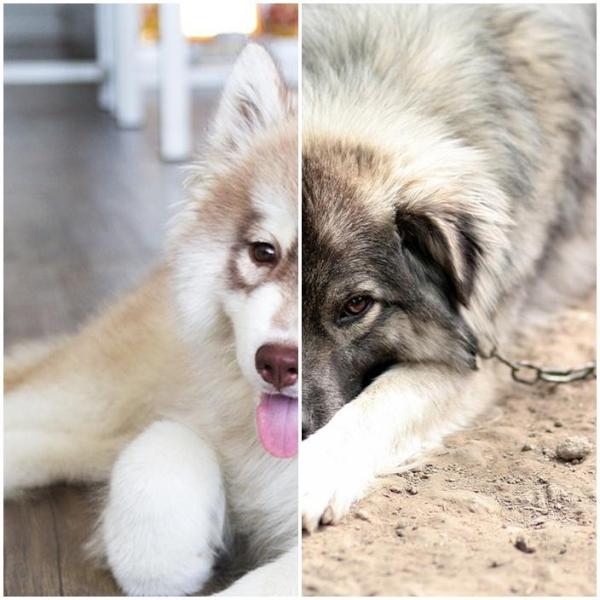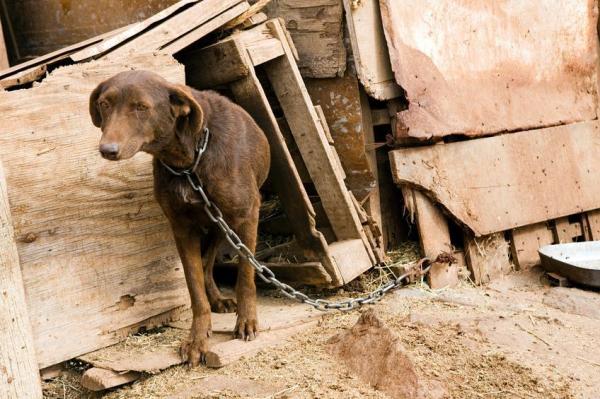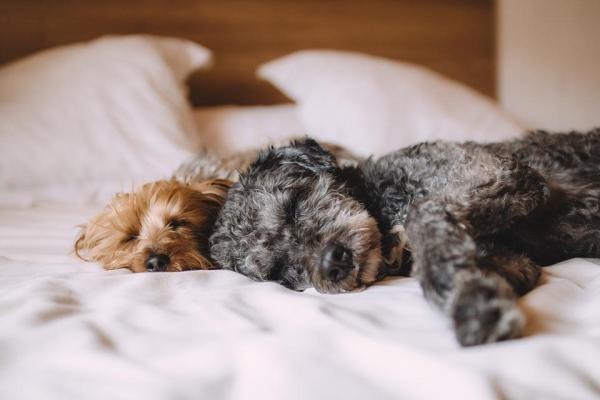
Choosing if your dog will live inside or outside the house is a decision that will influence your dog's behavior and attitude as an adult. Whether you've decided that your dog will live inside or outside or if you've yet to make up our mind, this article will be very useful to reach a final decision. In order to help you, in this AnimalWised article we'll outline the pros and cons of dogs living indoors and outdoors.
Should dogs live outside or inside? If you are a responsible owner, you will quickly understand why we recommend one of the two options. Read on and don't forget to comment and share your opinions and questions!
Should dogs live outside the house?
It is true that in the past, and especially in rural areas, most families preferred their dogs to live outside. This choice wasn't made to prevent dirt or shed hair, but because most dogs were kept as cattle dogs or guard dogs, not as pets.
Dogs are perfectly happy outside if they are going with you on a hike, for a walk, or to play fetch. Dogs are social animals that are used to living in packs, so spending long hours alone leaves them prone to feeling lonely, bored and marginalized. One of the most common problems in dogs that spend many hours alone is separation anxiety, which directly affects their behavior, making them anxious, stressed and destructive.
For that reason, even if you train your dog on a daily basis, you may start to notice your dog's behavior becoming unruly and uncharacteristic. They may also start suffering from "resource guarding", which is when they guard their territory and can become aggressive and dangerous, even towards their owners. Dogs are den animals; they need a warm and sheltered place, where they are surrounded by social stimuli. Without that, they will fiercely defend their territory - or backyard - and become harder to train.
On the other hand, one must also consider that the smartest dog breeds - which are also the most widely used in security and surveillance - are the most likely to suffer if they are forced to live outside the house. Dogs like German Shepherds, Doberman Pinschers or Malinois Belgian Shepherds require great mental, social and physical stimulation. Failure to meet these needs can lead to severe behavioral problems.
You should also be aware that dogs are not animals that can spend long hours lying around doing nothing; on the contrary, dogs need to run, play and discover new things to be happy. For that reason, there will come a day when your dog will decide to leave the garden or field in which they reside in pursuit of a small animal or scent trail that takes them somewhere away from home. This can create all sorts of risky situations for your dog, other people and other animals.
Tying them up will not fix the situation, as dogs cannot spend their lives in chains; this would ruin their physical and mental health. Keeping a dog chained, especially if they are already anxious, is a terrible idea. In this day and age, using dogs as guards is a very bad idea. Dogs are living beings that need attention, affection and a family: in general, guard dogs are sad and unmotivated animals. If you want a guard, invest in a burglar alarm instead.
If you are considering keeping a dog outdoors for hygiene purposes, bear in mind that there are dog breeds that don't shed hair. Having said that, remember that a dog is an animal that likes to sniff about; it is a form of relaxation and a way of learning about their environment. Like us, dogs like to spend time in comfortable places such as the sofa, although they may drool and make a bit of mess - and who doesn't? All these details are part of a dog's nature. If you are not willing to tolerate it, perhaps it is best not to have this loyal animal as a pet.

Should dogs live inside the house?
Once you've seen why dogs shouldn't live outside, it'll be easier to understand why it's better for dogs to live inside the house. In the home, your dog will enjoy being around people, receiving social stimuli and interacting with family members and other guests. If you want a sociable adult dog, it is essential that your pet learns to learn to relate to people. Having your dog inside the house is the best option.
Inside the home, a dog gains in quality of life:
- Seeing and stroking your dog regularly means you will more easily notice any possible illness, tumor or internal ailment.
- An indoors dog will also be less prone to the appearance of calluses on their elbows.
- A dog that lives inside the house is also less likely to suffer from parasitic diseases.
- Your dog's fur will be cleaner.
- Your dog will not suffer the consequences of bad weather, such as rain, snow, and extreme cold or heat.
If your dog lives inside the house, you will be more in sync with your dog's tastes, habits and personality. You will be helping in their development and socialization process, something that every dog should be able to enjoy.
Having a dog inside the house, whether you have a garden or not, is the option that every owner should choose if they love their pet. Discipline, patience and affection are the keys to enjoy a clean, careful and calm dog as a pet while still being active, excitable and happy when you go out together.

Do you have a dog? Where do they live, outside or inside the house? Tell us your opinion in the comments section!
If you want to read similar articles to Should Dogs Live Outside or Inside?, we recommend you visit our What you need to know category.
- Remember that, whether your dog lives inside or outside, it is important that it has for a walk every day to keep it happy and healthy.